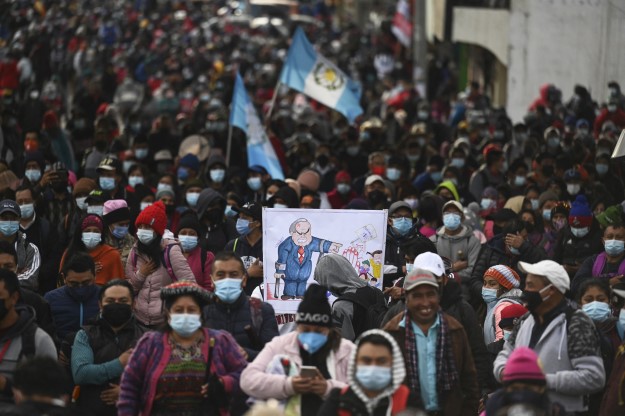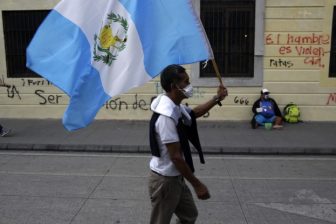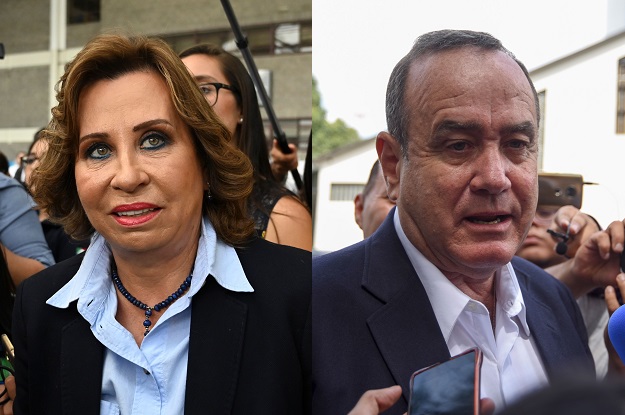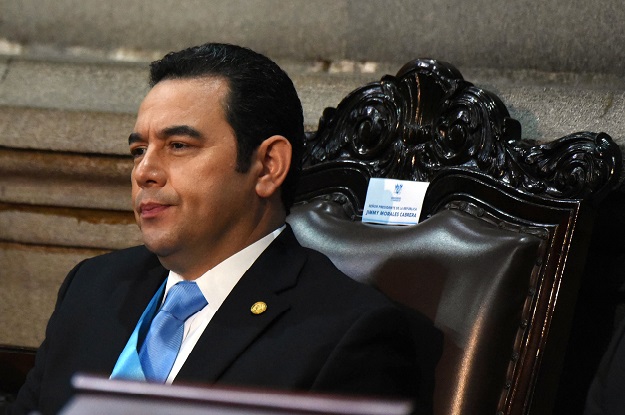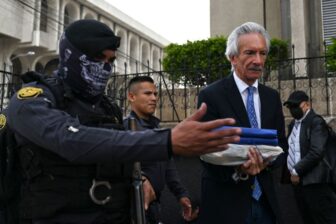One of Latin America’s worst vaccine rollouts. Mounting scandals. National protests calling for his removal. Things do not look like they are going well for Guatemalan President Alejandro Giammattei.
And yet, even with an approval rating hovering around 20%, Giammattei seems pretty secure in his job right now.
A national strike organized after the firing of anti-graft prosecutor Juan Francisco Sandoval drew thousands on July 29, with protesters and high-profile figures calling for Giammattei’s resignation. Still, “pressure would need to increase substantially for that to happen, including more protests, strikes and mobilizations,” said journalist Álvaro Montenegro, noting the president’s support from the Supreme Court, Congress and the attorney general who fired Sandoval.
While Sandoval’s removal drew anger on the streets, it’s also part of the reason why Giammattei may feel comfortable. The prosecutor’s departure has left few independent figures in the country’s justice system, further weakening already beleaguered efforts to investigate possible corruption by the president and the business and military elites that protect him.
“The state has practically abandoned the fight against corruption,” said Sandoval, whose office had been investigating high-level corruption cases, and who told AQ he had information indicating that his removal “was a request from the president himself.” Giammattei denies Sandoval’s claims.
While Washington cut assistance to the attorney general’s office after Sandoval’s removal and invited him to the White House on July 30, some see the Biden administration’s willingness to work with Giammattei on migration as having emboldened the president at a time when anger over a fumbled vaccine rollout – including a deal for Russian vaccines that never materialized – was rising.
“The president’s and the attorney general’s calculations may have been influenced by the perception of leverage granted by the privileged position assigned to Guatemala by the U.S., enshrined in Vice President Kamala Harris’ recent visit,” said Tiziano Breda, an analyst for International Crisis Group in Guatemala.
Harris’ visit in June was followed by two donations of 4.5 million vaccine doses – with a shipment arriving just three days before Sandoval’s firing.
“I don’t think the U.S. had a read on the current context of what’s going on in Guatemala,” said Marielos Chang, a professor at the Universidad del Valle de Guatemala and co-founder of the non-profit Red Ciudadana. “They threw Giammattei a life vest in goodwill, assuming he was actually going to comply with everything from the Harris visit.”
Still, the protests do show that Giammattei is “on thin ice,” said Breda.
“Popular discontent is mounting and could reach a tipping point if evidence of outright mismanagement and corruption are presented against his administration, particularly around vaccine procurement.”
That looks less likely, however, with Sandoval out of the picture. Since taking office in Jan. 2020, Giammattei has continued a purge of independent figures in the judiciary started by his predecessor, who shut down the UN-backed anti-corruption commission known as CICIG. This April, Guatemala’s Congress, controlled by allies of Giammattei, came under international scrutiny for not seating the re-elected chief justice of the Constitutional Court, Gloria Porras. At the time, Porras wrote in AQ that Guatemalan democracy was at a “breaking point.”
Before his presidency, Giammattei “was always a detractor to the work we were doing in coordination with CICIG,” Sandoval told AQ. “Ever since his arrival to power, he has sent direct and indirect messages scorning our work.”
All of this has helped Giammattei strengthen an alliance with the military and parts of the business establishment, as well as with parties that control Congress – necessary for his own political survival, perhaps, given his lack of a strong constituency of his own. A conservative, Giammattei was elected in 2019 on his fourth presidential bid, earning just 14% of the vote in the first round of an election marked by the controversial disqualifications of two frontrunners, including the former attorney general and anti-corruption figure Thelma Aldana. Giammattei later won the presidency after facing a polarizing former first lady in the runoff.
“This is a guy who has been part of five political parties, and who had been trying to be president for 20 years,” said Gabriel Wer, executive director of Instituto 25A, an NGO. “There’s no political project other than to be president and now to pay people back who financed him.”
A physician by training, Giammattei has been widely considered to have mismanaged the country’s response to the pandemic, and, officially, over 10,000 Guatemalans have died from COVID. His vice president even went on TV last year and suggested they both resign. As of July 31, less than 2% of Guatemalans were fully vaccinated.
“If he finishes his term, I think it will almost be miraculous,” said Vaclav Mašek, a Guatemalan sociologist who studies democratic backsliding in Central America at the University of Southern California.
In addition to a worsening COVID situation, Giammattei’s fortunes could change if there is greater pressure from the private sector, which until now has largely stood by him.
“There’s a lot of fear within the private sector,” said Luis Barrueto, a human rights advocate. “Of Giammattei’s entire alliance, the one group that is more sensitive to what the U.S. does is the organized private sector.”
While Guatemala’s most powerful business organization, CACIF, put out a bland statement that did not condemn Sandoval’s firing, some groups have expressed concern, including the American Chamber of Commerce in Guatemala and National Business Council (CNE), which formed this year.
“We’re worried that we can’t invest in a country where there is corruption everywhere you look,” María Fernanda Rivera, the CNE’s president, told AQ. “We’re worried because the message that’s being sent by the actions of July 23 (Sandoval’s removal) is that Guatemala is not a stable climate for investing.”


